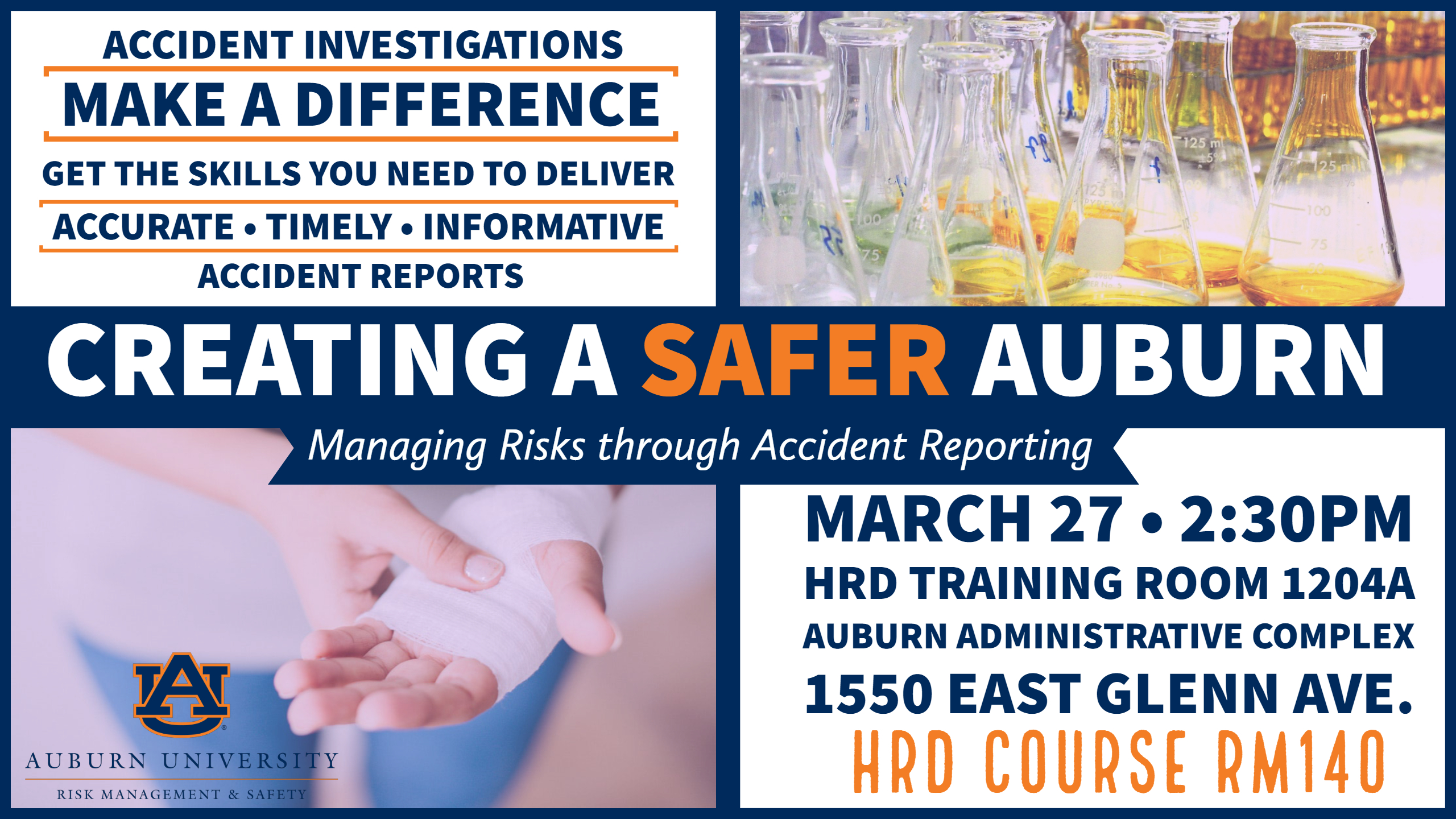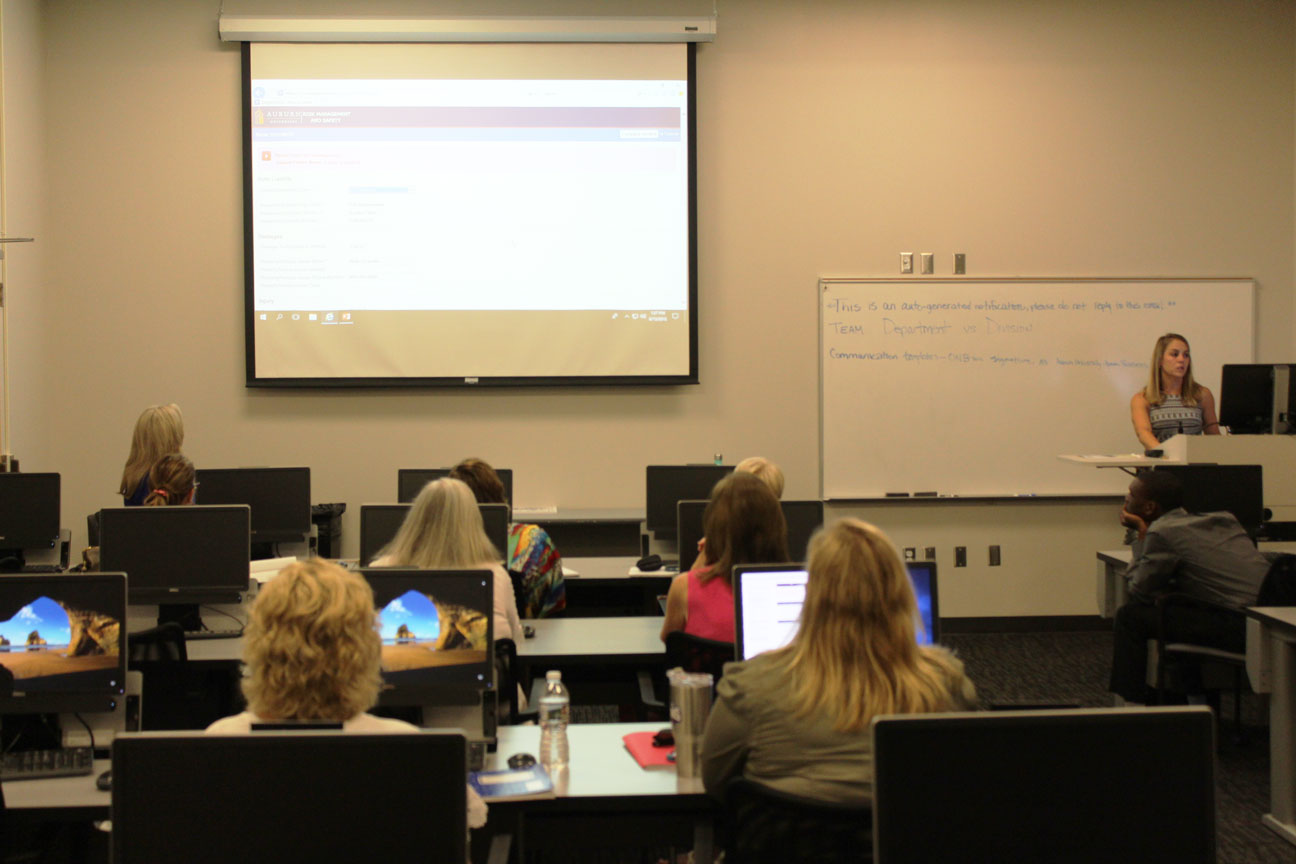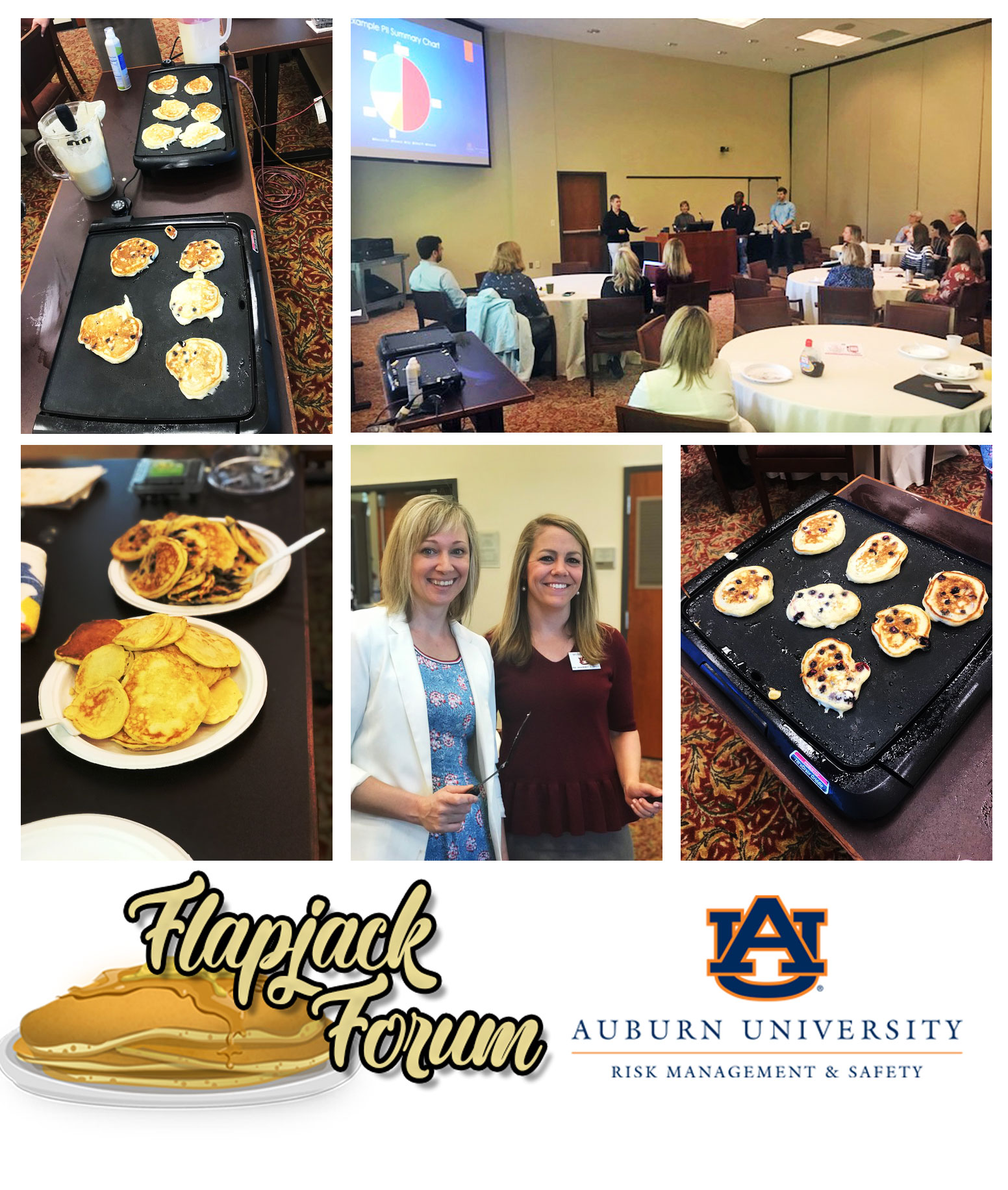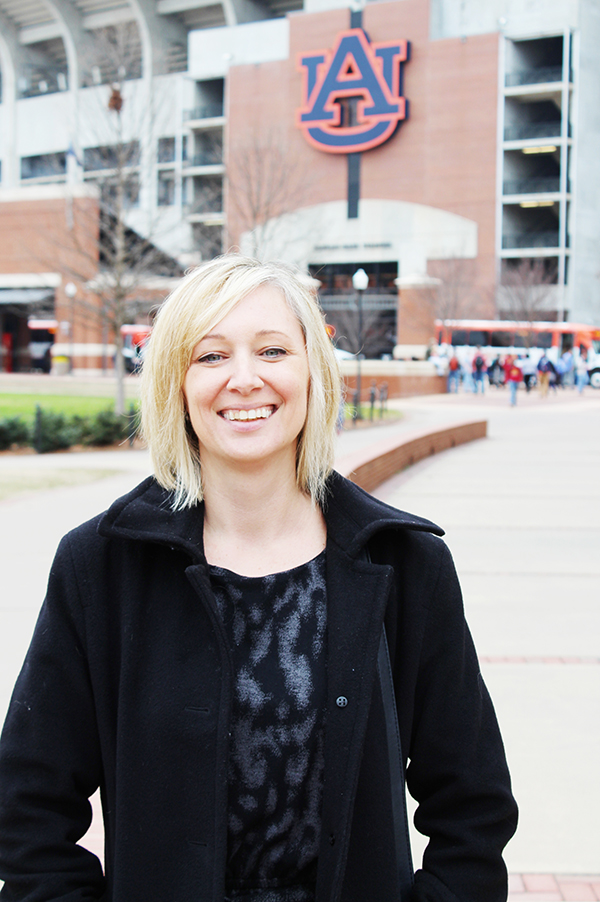RMS
Auburn Risk Management and Safety Featured on URMIA Matters Podcast
7/7/2021
The University Risk Management and Insurance Association (URMIA) recently featured Auburn University and Risk Analyst Evan Ferguson on their URMIA Matters podcast. The podcast discussed the Student Property Insurance Program (SPIP). Evan detailed how the program has helped Auburn University Risk Management and Safety better serve the University and how the program benefits Auburn student faculty and staff. You can listen here: https://urmiamatters.buzzsprout.com/687161/8757933-problem-solved-urmia-student-property-insurance-program
The SPIP program, which is available to all Auburn University students, faculty, and staff, helps to better protect and insure some of the items we use everyday while on campus.
Frequent cases of property loss include theft and accidental damage (dropping, spilling liquids, and similar events). If this were to happen, your out-of-pocket costs to repair or replace will generally run between $500 and $2,000.
Although some homeowners policies provide some coverage, they generally do not cover “breakage” or accidental damage, and usually have high deductibles that effectively leave most property losses unrecoverable. For these reasons, it is strongly encouraged to have a personal property insurance policy for their belongings while living and working on campus. You can learn more about the SPIP at Auburn here: https://cws.auburn.edu/rms/pm/rentersinsurance
Building Surveys
10/17/2019
Risk Management & Safety will be working with Duff and Phelps, LLC to survey properties insured by the State Insurance Fund. Representatives will be on campus from October 21st, 2019 – October 25th, 2019 to assess current condition and valuation of select buildings. You may notice the surveyors entering mechanical rooms, electrical closets, and other restricted areas; however, they will be accompanied by AU Facilities Management. Every effort will be made to schedule surveys at times that are convenient for building occupants.
Questions or concerns may be directed to Risk Management & Safety at 844-4533.
Risk Management and Safety Develops New Resource to Help Plan Fieldtrips
8/5/2019
Auburn University Risk Management and Safety has developed a new resource to help academic departments safely plan university field trips. The Field Trip Guidelines page located at https://cws.auburn.edu/rms/pm/fieldtrip has been designed to provide a central location for anyone seeking information and guidance when arranging a field trip. The resources housed on this page include guides, checklists and recommendations for all aspects of field trip planning, including accommodating students, emergency situations and accidents, transportation considerations, insurance and more.
The resources on this page will help identify and assess any hazards or potential risks associated with the upcoming field trip to make all university field trips safe and successful.
Auburn University Risk Management and Safety is here to help make future field trips a success and can assist with the completion of hazard assessments and address any questions about the information and resources provided on the new Field Trip Guidelines page.
For more information, contact 334-844-4870 or aurms@auburn.edu.
Risk Management and Safety Announces Change of Third Party Administrator Handling On-the-Job-Injury, General Liability, Auto Liability, and Auto Property Damage Claims
5/1/2019
Effective May 1, 2019 Brentwood Services Administrators will assume the role of Third-Party Administrator for Auburn University. Brentwood Services Administrators will handle administration for all new and existing On-the-Job-Injury, General Liability, Auto Liability, and Auto Property Damage claims for Auburn University. Claims or incidents can be reported through the incident entry portal at https://cws.auburn.edu/rms/pm/claims. After hours emergency claims can be reported directly to Brentwood Services Administrators at (800) 524-0604. If you should have questions regarding the transition, please contact Risk Management and Safety at (334) 844-4533.
Creating a Safer Auburn: Managing Risks through Accident Reporting
3/25/2019
Risk Management and Safety will offer a unique HRD program entitled: Creating a Safer Auburn: Managing Risks through Accident Reporting on Wednesday March 27th at 2:30pm.
This informative and important course is designed for Auburn employees and will help foster a proactive safety culture for any department by helping you become an impactful safety ambassador for your unit.
Accidents can occur at Auburn University. Before they do, RMS wants you to have the best tools and resources to manage risk.
RMS will cover a broad range of informative topics related to Accident Reporting including an overview of the accident investigation process, awareness of the resources available to help you collect an effective report, and what to expect after an accident using key lessons learned from real-world experiences.
The offering number 19632 and course code RM140.
If you have any questions, please contact Auburn University Risk Management and Safety at aurms@auburn.edu

Campus Building Surveys
3/25/2019
Risk Management & Safety will be working with Duff and Phelps, LLC to survey properties insured by the State Insurance Fund. Representatives will be on campus from February 25, 2019 – March 1, 2019 to assess current condition and valuation of select buildings. You may notice the surveyors entering mechanical rooms, electrical closets, and other restricted areas; however, they will be accompanied by AU Facilities Management. Every effort will be made to schedule surveys at times that are convenient for building occupants.
Questions or concerns may be directed to Risk Management & Safety at 844-4533.
Campus Building Surveys to be conducted February 25 through March 1
2/15/2019
Risk Management & Safety will be working with Duff and Phelps, LLC to survey properties insured by the State Insurance Fund. Representatives will be on campus from February 25, 2019 – March 1, 2019 to assess current condition and valuation of select buildings. You may notice the surveyors entering mechanical rooms, electrical closets, and other restricted areas; however, they will be accompanied by AU Facilities Management. Every effort will be made to schedule surveys at times that are convenient for building occupants.
Questions or concerns may be directed to Risk Management & Safety at 844-4533.
Risk Management and Safety implements new 12 & 15-passenger van policy
1/29/2019
In response to new federal regulations that now require newer 12 and 15-passenger vans to have additional safety features like Electronic Stability Control and Tire Pressure Monitoring Systems, Risk Management & Safety has updated Auburn University’s 12 & 15-passenger van policy to allow for the purchase of vans model year 2012 and newer. The National Highway Traffic Safety Administration (NHTSA) recently stated that rollover is no longer a danger for newer 15-passenger vans due to the implementation of these new safety requirements.
Other highlights of the updated policy include:
- The requirement that the number of occupants must be less than eight (8) has been removed for vans that are model year 2012 and newer.
- Please note seat belts should be worn by all occupants at all times, so the number of occupants should never be more than the number of seat belts.
- For vans that are model year 2011 and older, the requirement that the number of occupants should be less than eight (8) remains in effect.
- Additionally, vans that are model year 2011 and older should not be driven distances greater than 25 miles from the point of origin nor should they be driven on interstate highways.
- In addition to the existing driver training requirements, there are new requirements for drivers of 12 & 15-passenger vans and mini-buses:
- Drivers must be age 21 or older (18 or older if driving is restricted to on-campus)
- Drivers must have a current motor vehicle record (MVR) within the past two years on file with Risk Management & Safety prior to operation
Departments will be responsible for providing Risk Management & Safety with a list of their van drivers so that MVR’s can be ordered and reviewed for approval.
A full copy of the updated policy can be found here.
Human Resource Development Class details Auburn Univeristy's OJI Program
6/13/2018
On Wednesday, June 13, Auburn University Risk Management and Safety held a Human Resource Development course on the On-the-Job Injury Program (OJI).
Risk Management Specialists Holly Leverette and Brooke Patton gave real world scenarios and statistics showing how critical proper claim reporting is and the frequency, severity, and type of claims that have been handled by Auburn University.
The majority of the presentation went over how to report an OJI Claim and explained the program in more detail. This will allow for future claims to be handled promptly and properly and will benefit all Auburn University student, faculty, and staff.
Auburn University is exempt from State of Alabama’s Worker’s Compensation laws (25-5-50); however, Auburn’s OJI Program provides financial assistance to injured employees where no other benefits exist. The program is a benefit, not insurance, and provides benefits only after all other applicable insurance coverage has been exhausted. The program’s goal is to help protect employees from financial hardship caused from on-the-job injuries or illnesses. Risk Management and Safety is responsible for administration of the OJI Program.
More information on the OJI program can found at Risk Management and Safety’s website. There you will be able to view today’s presentation, get step by step instructions, and most importantly, file a claim.
For more information on today’s presentation or Auburn’s OJI program, please contact Auburn University Risk Management and Safety at 334-844-2502 or online at auburn.edu/rms.

Risk Management and Safety's Flapjack Forum Helps Educate, Advise, and Inform.
4/9/2018
Auburn University Risk Management and Safety held their quarterly Flapjack Forum on Thursday, April 5th at the School of Forestry and Wildlife Sciences. Guests were treated to free pancakes and a casual and relaxed atmosphere designed to improve communication of university risk across all units, departments, and colleges of Auburn University to better support the University’s mission. In a previous forum, data security was identified at a high impact and high likelihood risk for Auburn University. To help inform, educate, and begin a dialogue on data security; the Office of Information Technology presented recommendations to protect Personally Identifiable Information.
Personally Identifiable Information (PII) is currently defined by Auburn University as Social Security and Credit Card numbers. When PII is compromised through a data breach, it can lead to reputational damage, potential lawsuits and fines, and create a significant administrative burden. According to the 2017 Ponemon Institute Cost of Data Breach Study, the average total cost for a data breach in 2017 was $3.62 Million and the average size of a breach was 24,000 records.
OIT presented easy and hassle free ways to protect your PII on personal and university computers. These included recommendations to not store PII on external devices (such as thumb or flash drives), permanently deleting PII no longer needed (such as old budget files or hiring documents), and emptying the recycle bin of your computer regularly. One example of a recent PII scan by OIT discovered that 50% of the PII that was found resided on external drives. Although some units must handle PII on a regular basis, OIT recommended having secure business processes to help mitigate some of risk. OIT is here to help and aide any department to better protect their PII and determine where any weak points may reside and can be contacted at 334-844-4944. It is recommended that you reach out to OIT and find how to better protect yourself and your department.
Risk Management and Safety is committed to protect people, the environment, property, financial, and other resources in support of Auburn University’s teaching, research, outreach, and student services. The Flapjack Forum helps to accomplish this by understanding the needs and priorities of the university and developing materials and resources to provide guidance. For more information about how to attend the next Flapjack Forum and the mission of Auburn University Risk Management and Safety, please contact Kevin Ives at 334-844-2502 or email at pki0002@auburn.edu .

Celebrating "Insurance Careers Month" - Meet Our RMS Staff
2/22/2017
Valentine’s and groundhogs, heart health and Superbowl Sundays – these are the things we most commonly associate with the month of February each year. However, since 2016, the insurance industry has been recognizing February for a special time all its own – Insurance Careers Month.
According to insuremypath.org, Insurance Careers Month is a cross-industry, multi-phased initiative designed to raise awareness of the dynamic career opportunities in the risk management and insurance profession, and to recruit the next generation of industry leaders. Unfortunately, many students and young professionals have no idea these careers even exist or, at best, they have a genuine misunderstanding of the risk management and insurance fields.
To help bring awareness to this lucrative field, throughout February, Auburn University Risk Management & Safety will highlight several of our dedicated Risk Management & Insurance (RMI) staff members, who will share their experiences and perspectives on a field that has shaped their lives, from the higher education RMI standpoint.
Participate in the national conversation about Insurance Careers Month by following #InsuranceCareersMonth and #CareerTrifecta on social media.
Meet Patrick White, Risk Management Specialist
White Finds Variety & Opportunities in Insurance Career
As an undergraduate student at the University of Georgia in the early 2000s, Patrick White was drawn to the Risk Management & Insurance field because of the vast array of opportunities available. From production to underwriting, to claims and loss control, among others, the field offered a wide variety of career options.
White has worked as a commercial account executive handling global accounts for an insurance group, and an account representative for State Farm, among others. He came to work in higher education in 2015 as an Auburn University Risk Management Specialist, a setting he finds particularly appealing.
“The risks inherent to higher education are very unique when compared to the commercial sector,” said White, who is currently pursuing a master’s in higher education administration. “I have enjoyed applying what I have learned over my years in the industry while at the same time learning how the higher education model differs from the commercial accounts I worked with in the past.”
Analytical by nature, White enjoys policy review, and providing counsel and advice on how to address risks facing Auburn University. His day-to-day job responsibilities consist of managing the university’s automobile self-insurance program; overseeing the administration of the University Fleet Policy; handling claims; collecting information from departments to provide to the university’s insurance companies; and reviewing contracts, among others.
“Insurance has opened many doors for me in my career,” White said. “It has also opened my eyes to many ways that risk management and insurance can affect the quality of life for so many individuals.”
Here’s what else he had to say about his experiences in the risk management and insurance industry thus far.
What would you say is the most difficult part of your job?
WHITE: The most difficult part of my job is that I have to be a professional at reacting to situations as they come my way. As a planner, I find it hard sometimes to switch gears from the comprehensive projects that I may be working on to deal with the pressing issues that can come through our office on any given day, such as claims or general questions regarding the risk implications of various activities across campus.
Do people misunderstand your industry? If so, in what ways and why do you think there is misunderstanding?
WHITE: Many people on the outside see us as the “no” people – trying to find ways to keep fun things from happening. However, we like to have fun, too. We just want people to be safe, and we want to make sure the university’s interests are protected, which benefits us all. Getting people to think about all the risks associated with any given activity can be challenging at times.
What is the biggest obstacle facing the insurance industry right now? How will you work to overcome it in your position?
WHITE: It has been widely documented that a mass exodus of insurance talent is imminent due to the aging work force. Coupled with the struggle to recruit new talent to the field, this will present somewhat of a crisis in the next decade. I work hard to promote our industry and encourage new talent to consider risk management and insurance as a career. Our department is hiring an undergraduate intern this summer for that very reason, and I play an integral role in the planning and administration of this exciting opportunity. Having completed an underwriting internship while an undergraduate, I appreciate the invaluable experience an internship can afford for someone looking to choose a career path.
What advice would you give to someone thinking of seeking a career in your industry?
WHITE: My advice would be to work in a customer-facing position in the early stages of your career. I always said I did not want to go into sales, but then I ended up working in insurance production for almost eight years before coming to Auburn. Having to put myself out there and learn how to market a product gave me a better understanding of how to market myself. Also, start early with securing industry credentials like CPCU or ARM. It only gets harder to complete those designations as you get older and take on more responsibility.
Meet Melissa Agresta, Auburn University Risk Manager
Former Art Student Finds Creativity in RMI
 Auburn’s University Risk Manager Melissa Agresta began her career in risk management in a way that many people might not consider – working with art museums. The Virginia native and mom of three earned a bachelor of arts in studio art and art history from James Madison University; a master’s in risk management & insurance from Florida State University; and she is currently pursuing a doctorate of philosophy in adult education from Auburn University.
Auburn’s University Risk Manager Melissa Agresta began her career in risk management in a way that many people might not consider – working with art museums. The Virginia native and mom of three earned a bachelor of arts in studio art and art history from James Madison University; a master’s in risk management & insurance from Florida State University; and she is currently pursuing a doctorate of philosophy in adult education from Auburn University.
Agresta “happened upon” the insurance industry when she took a position right after undergraduate school working as a technical assistant and, later, vice president for specialty areas for private brokerage firm Willis Towers Watson in Arlington, Virginia. Her work focused on insurance and risk evaluation/development for some of the nation’s most prestigious art museums, galleries, dealers, collectors and universities. Many of her clients were risk managers for higher education institutions and, through their influence, she grew fond of the idea of working in risk management for a university.
Agresta began work at Auburn University in 2012 as a risk management specialist and moved into the role of university risk manager in 2015. She oversees four other risk management specialists and works diligently to ensure her department’s responsibilities align with the university’s mission. Not only does her team uncover new risks but they also advise the university on how to address them.
Did You Know: CNN Money chose “risk management director” as the No. 2 job in America, second only to “mobile app developer,” on its list of top 100 careers in 2017 with “big growth, great pay and satisfying work.”
In her spare time, Agresta still enjoys art and photography, but she has found the field of risk management and insurance does offer opportunities for those with creative minds. “It’s a field that requires the generation of new ideas and problem solving, something those with an artistic side thrive on,” Agresta said. “RMI is continually changing and offers many opportunities to make a difference. You could be risk manager for a diversity of organizations, ranging from anything such as a large manufacturing company or a city, to a national park or even an NFL team.”
Here is what else Agresta had to say about her more than 10-year journey into the risk management and insurance industry, and advice she has for young minds considering pursuing a career in RMI.
What are some of the differences in working in RMI somewhere else as opposed to higher education?
AGRESTA: After spending nine years working in the corporate world, I would say the biggest difference is the culture. In the corporate world, and especially a company with stockholders, there is always a preoccupation with profits and financial growth. It is competitive and fast-paced. Sweeping changes are sometimes implemented unexpectedly. In higher education, the focus is more on supporting a university’s mission, which is not making money, but serving the community and providing world-class education and research. Change is more gradual and, in general, the environment is supportive of employee professional development and less concerned with internal competition. That is not to say one is better than the other though, as they each offer unique perspectives. However, where one will be most satisfied will depend on your personal characteristics and goals.
What is the most difficult part of your job?
AGRESTA: The most difficult part of the job is effectively communicating what RMI does and why it is important, so that others understand we are trying to help. In order to be a good risk manager, you have to build credibility and relationships with a wide variety of people. If you are not successful at this, then you will not be able to effect positive change and promote a healthy risk culture in your organization.
Why do you think people misunderstand what RMI is and what it does?
AGRESTA: Society tends to have a negative view of the insurance industry as a whole. Words like “boring,” “unfair,” or “greedy” come to mind. What people misunderstand is that insurance is the financial backing allowing businesses to prosper without the worry of financial ruin. It is a basic building block of a sound economy.
How has your career in risk management and insurance changed/defined your life?
AGRESTA: My insurance career has spanned different organizations, as well as, having given me the opportunity to be on both the sales side and the client side. Through my work, I have had the opportunity to visit Lloyds of London where I learned the history of the industry and how it ties into the greater economy. By being in an academic environment, I have been inspired to become a lifelong learner. I have had the pleasure of working with people from all different types of backgrounds, such as wealthy art collectors, academics and fellow administrative staff here at Auburn. I have gotten to witness first-hand the problems facing our society and the solutions people are always creating. I feel that it has helped me become a well-rounded individual, one who has learned how to communicate and relate to many different people.
What advice would you give to someone thinking of seeking a career in your industry?
AGRESTA: I think the risk and insurance industry is an exciting field that offers many opportunities for success. For anyone wanting to enter the industry, I recommend a few things. First, tailor your education. Many institutions offer degrees with a focus on risk management & insurance. Additionally, obtaining insurance industry designations such as the CPCU, ARM or CRM, which will add to your credibility and knowledge, and really give you an advantage over other candidates. Second, make industry connections and develop relationships. Find a good mentor. Third, try to get relevant experience as soon as possible. Internships and/or apprenticeships are a great opportunity. Consider taking jobs that are entry level and not necessarily your dream job, but a stepping-stone. Last, do not be afraid to keep your opportunities open geographically, if possible, otherwise you will be severely limiting your potential.


